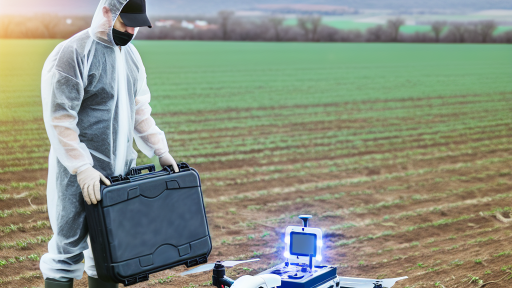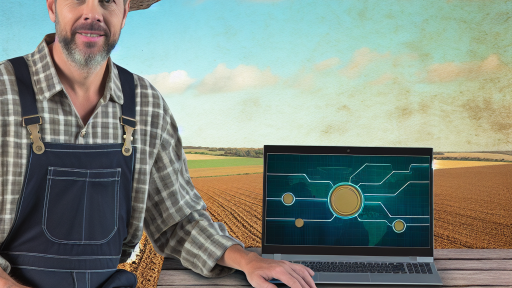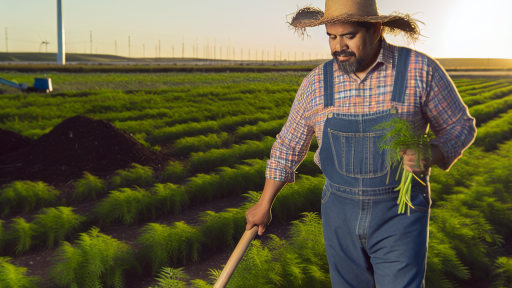Understanding Agri-Fintech
Definition of Agri-Fintech
Agri-Fintech refers to the integration of financial services with agricultural technologies.
It supports farmers through innovative financial solutions and technology.
This combination enhances efficiency in farm management and helps reduce risk.
Importance of Agri-Fintech in Modern Agriculture
Agri-Fintech plays a vital role in transforming agricultural practices.
It provides farmers with access to capital when needed the most.
Moreover, it enables precision farming and data-driven decision-making.
Through these technologies, farmers can analyze soil health and crop performance.
Consequently, they can optimize resource use and increase yields.
Facilitating Financial Inclusion
Agri-Fintech significantly enhances financial inclusion for smallholder farmers.
It provides alternative financing options to those lacking traditional bank access.
Through mobile applications and online platforms, farmers can apply for loans easily.
This process bridges the gap between financial institutions and rural communities.
Leveraging Technology for Improved Outcomes
Integrating technology with finance creates smarter farming solutions.
For instance, data analytics improves forecasting and planning.
Farmers receive insights into weather patterns and market trends.
Transform Your Agribusiness
Unlock your farm's potential with expert advice tailored to your needs. Get actionable steps that drive real results.
Get StartedAdditionally, blockchain ensures transparency and traceability in supply chains.
This fosters trust between producers and consumers.
Promoting Sustainability
Agri-Fintech contributes to sustainable agricultural practices.
It encourages the efficient use of resources, minimizing waste and environmental impact.
Furthermore, access to financial data helps farmers invest in eco-friendly technologies.
Ultimately, this alignment with sustainability ensures long-term farming viability.
Key Agri-Fintech Technologies
Overview of Tools and Platforms
Agri-fintech technologies revolutionize farm management.
They combine agriculture with innovative financial solutions.
Farmers can access data-driven insights for better decisions.
Several key technologies are shaping this landscape.
Digital Platforms for Financial Management
Digital platforms streamline financial operations for farmers.
These tools help track expenses, revenue, and investments.
Furthermore, they facilitate access to credit and insurance services.
Examples include FarmLogs and AgroStar.
Data Analytics Tools
Data analytics tools allow farmers to interpret complex data.
They provide insights on crop performance and market trends.
AgriWebb and Cropio offer powerful analytics solutions.
Using these tools enhances strategic planning and productivity.
Smart Farming Technologies
Smart farming employs IoT devices for efficient monitoring.
Sensors collect real-time data on soil, weather, and crops.
This information optimizes water usage and fertilizer application.
Companies like John Deere and Trimble lead in smart farming innovations.
Mobile Applications for Accessibility
Mobile applications make agri-fintech accessible on-the-go.
Farmers can monitor their operations from their smartphones.
Showcase Your Farming Business
Publish your professional farming services profile on our blog for a one-time fee of $200 and reach a dedicated audience of farmers and agribusiness owners.
Publish Your ProfileApps provide forecasting, alerts, and management tools.
Examples include AgriSync and Farmr.
Blockchain for Transparency
Blockchain technology enhances transparency in supply chains.
It ensures traceability of products from farm to table.
Farmers and consumers can verify product origins easily.
Companies like IBM and Provenance are pioneers in this field.
Benefits of Integrating Fintech Solutions into Farm Management Practices
Enhanced Financial Management
Integrating fintech solutions significantly improves financial management for farmers.
Farmers can efficiently track their incomes and expenses.
Moreover, they gain access to real-time data on financial performance.
This enables better budgeting and forecasting capabilities.
As a result, farmers can make informed decisions regarding investments.
Access to Credit and Funding
Fintech platforms provide enhanced access to credit for farmers.
Through these platforms, farmers can easily apply for loans online.
This simplifies the funding process, reducing traditional banking barriers.
Additionally, farmers benefit from flexible repayment terms tailored to their needs.
Consequently, they can invest in new technologies or expand their operations.
Improved Supply Chain Management
Integrating fintech solutions streamlines supply chain management.
Farmers can trace products from field to consumer more effectively.
This transparency helps improve trust among stakeholders in the supply chain.
Furthermore, it aids in managing inventory and reducing waste.
Ultimately, farmers can respond quickly to market demands.
Data-Driven Decision Making
Fintech solutions empower farmers with data analytics for better decision-making.
Farmers can analyze trends and identify opportunities for efficiency improvements.
Through these insights, they can enhance crop yields and reduce costs.
Additionally, farmers can easily monitor weather patterns and adjust accordingly.
This proactive approach leads to increased resilience against challenges.
Streamlined Payment Processes
Fintech platforms simplify payment processes for farmers and suppliers alike.
Digital transactions reduce the need for cash handling, enhancing security.
Furthermore, farmers can receive payments faster than traditional methods allow.
This ensures better cash flow management throughout the growing season.
In turn, farmers can reinvest in their operations promptly.
Increased Market Access
Fintech solutions grant farmers increased access to global markets.
Online platforms enable them to showcase and sell their products directly.
This direct access often leads to better pricing and increased profitability.
Additionally, farmers can connect with agricultural experts and resources.
Such connections provide vital knowledge for expanding their markets.
See Related Content: How Genetically Modified Crops Improve Farm Yields
Case Studies: Successful Agri-Fintech Implementations Around the Globe
Transforming Farming in India
A startup named CropIn leveraged technology for better farming outcomes.
They developed a cloud-based platform for farmers.
This platform uses data analytics to provide actionable insights.
Showcase Your Farming Business
Publish your professional farming services profile on our blog for a one-time fee of $200 and reach a dedicated audience of farmers and agribusiness owners.
Publish Your ProfileFarmers improved their crop yield by up to 30% using their services.
Additionally, CropIn helps in real-time pest detection.
This proactive approach minimizes crop loss significantly.
Improving Credit Access in Africa
Agricultural lender FarmDrive transformed credit access in Kenya.
They developed a mobile application for farmers.
This app collects and analyzes data to assess creditworthiness.
As a result, many farmers now receive loans that were previously unattainable.
FarmDrive’s technology enables faster loan approvals.
This enhancement supports local farmers in scaling their operations.
Enhancing Supply Chain Transparency in Brazil
Agrosmart implemented smart sensors for Brazilian soybean farmers.
These sensors monitor environmental conditions in real-time.
Farmers can respond promptly to changing weather patterns.
Furthermore, the platform integrates traceability features for consumers.
This integration builds trust and satisfies consumer demands.
Consequently, farmers experience an increase in sales due to transparency.
Utilizing Blockchains for Trust in Europe
Connecting Food, a European initiative, employs blockchain technology.
This technology ensures everything from farm to fork is traceable.
By providing transparency, consumers are more inclined to trust brands.
Consequently, farmers receive better prices for their products.
This transparent system enhances food safety as well.
Farmers and consumers alike benefit from this initiative.
Advancements in Precision Agriculture in the USA
The company Farmers Edge is pioneering precision agriculture in North America.
They deploy advanced satellite imaging combined with AI technologies.
This system allows farmers to optimize their resource usage.
Crop health monitoring leads to data-driven decision-making.
Farmers see measurable increases in productivity and sustainability.
This shift contributes to more efficient farming practices overall.
Gain More Insights: Drone Technology Revolutionizing Sustainable Farming Practices
Challenges and Barriers in Adopting Agri-Fintech Technologies
Understanding the Technological Divide
Many farmers face challenges in accessing advanced technologies.
This divide often stems from a lack of digital literacy.
Moreover, some agricultural communities have limited internet connectivity.
Consequently, they miss out on important agri-fintech solutions.
Financial Constraints
Implementing agri-fintech technologies can require significant investment.
Small-scale farmers often struggle to secure necessary funding.
This financial barrier limits their ability to adopt innovative solutions.
Additionally, high costs can deter farmers from engaging with new technologies.
Adoption Resistance
Resistance to change is common in traditional farming practices.
Many farmers prefer to stick with familiar methods.
This reluctance hampers the integration of agri-fintech in their operations.
Furthermore, there may be skepticism about the effectiveness of new tools.
Showcase Your Farming Business
Publish your professional farming services profile on our blog for a one-time fee of $200 and reach a dedicated audience of farmers and agribusiness owners.
Publish Your ProfileRegulatory and Compliance Challenges
Navigating regulations can complicate the adoption of agri-fintech solutions.
Farmers often face bureaucratic hurdles that slow innovation.
Additionally, compliance with new regulations can impose extra costs.
These complexities may discourage farmers from pursuing new technologies.
Limited Awareness and Training
Many farmers lack awareness of available agri-fintech options.
This knowledge gap can prevent them from utilizing beneficial tools.
Moreover, insufficient training programs hinder effective implementation.
Farmers need access to resources that educate them about these technologies.
Gain More Insights: Biotechnology Innovations Driving Smart Agriculture

Strategies for Farmers: Best Practices for Implementing Fintech Solutions
Understand Your Needs
Every farm has unique financial requirements.
Begin by assessing your specific operational needs.
Consider your current financial challenges.
This clarity will guide you toward the right solutions.
Choose the Right Technology
Select technologies that streamline your financial processes.
Evaluate various fintech platforms before committing.
Look for user-friendly interfaces and strong customer support.
The right technology should enhance decision-making capabilities.
Emphasize Data Security
Data security must be a top priority in fintech selection.
Research the provider’s security measures thoroughly.
Trustworthy platforms use encryption and secure storage protocols.
Ensure compliance with relevant data protection regulations.
Integrate with Existing Tools
Integration is crucial for seamless farm management.
Check compatibility with your current management software.
A smooth integration process saves time and resources.
It also minimizes disruptions during the transition.
Train Your Team
Successful implementation hinges on your team’s readiness.
Provide comprehensive training for all users.
Ensure everyone understands how to use the new tools effectively.
Regular practice will build proficiency in using the fintech solutions.
Monitor and Evaluate Performance
Continuously monitor the effectiveness of the technology.
Regularly assess how well the fintech solutions meet your needs.
Gather feedback from your team to identify areas for improvement.
This process helps optimize your farm management practices.
Stay Informed About Market Trends
The fintech landscape is constantly evolving.
Keep abreast of new technologies and trends in agri-fintech.
Attend seminars, webinars, and industry forums.
Stay connected with peers to share insights and experiences.
Delve into the Subject: Overcoming Challenges in Controlled Environment Agriculture for Farmers
Future Trends in Agri-Fintech: Innovations on the Horizon
Emerging Technologies
New technologies are reshaping the agriculture landscape.
One significant innovation is blockchain technology.
Showcase Your Farming Business
Publish your professional farming services profile on our blog for a one-time fee of $200 and reach a dedicated audience of farmers and agribusiness owners.
Publish Your ProfileBlockchain enhances transparency and traceability in supply chains.
Additionally, it secures transactions, reducing fraud risks.
Another noteworthy advancement is the Internet of Things (IoT).
IoT devices provide real-time data on soil health and crop conditions.
This data empowers farmers to make informed decisions promptly.
Moreover, artificial intelligence (AI) plays a crucial role.
AI algorithms analyze vast amounts of data for predictive analytics.
This capacity allows for better resource allocation and crop management.
Financial Innovations
Innovations in financial services are equally transformative.
Fintech solutions offer farmers access to microloans and credit.
This access helps them invest in essential technologies and materials.
Furthermore, crowd-funding platforms enable community support for farmers.
This model democratizes funding and nurtures local agricultural initiatives.
Additionally, automated investment platforms simplify investment processes.
Farmers can now invest in agri-tech projects with ease.
These financial innovations increase overall efficiency and growth potential.
Sustainability Focus
Future trends will increasingly emphasize sustainability.
Agri-fintech solutions provide tools to enhance sustainable farming practices.
For instance, precision agriculture optimizes resource usage.
This technique reduces waste and increases crop yield.
Moreover, data analytics helps in understanding climate impacts on farming.
Farmers can adapt strategies based on predictive climate modeling.
Thus, sustainability and profitability can coexist through innovation.
Collaborative Platforms
Collaboration among stakeholders is gaining traction.
Farmers, tech companies, and financial institutions are forming alliances.
These partnerships foster the development of innovative solutions.
Additionally, shared platforms facilitate knowledge exchange and resources.
This collaboration leads to enhanced problem-solving approaches.
Ultimately, it supports the collective goal of advancing agriculture.
The Role of Data Analytics in Enhancing Farm Financial Decision-Making
Importance of Data-Driven Decisions
Data-driven decisions lead to better outcomes for farm management.
Farmers can leverage data to optimize crop yields and resource use.
Additionally, analyzing financial data improves overall profitability.
Types of Data Analytics in Agriculture
Farmers can utilize predictive analytics to forecast trends.
This technique helps anticipate market fluctuations and yields.
Moreover, descriptive analytics gives insights into past performance.
This understanding allows farmers to identify areas for improvement.
Tools and Technologies for Data Collection
Modern technologies play a crucial role in data collection.
For instance, satellite imagery provides detailed land assessments.
Drones can gather real-time data on crop health and conditions.
Mobile applications facilitate easy data entry and access on the go.
Showcase Your Farming Business
Publish your professional farming services profile on our blog for a one-time fee of $200 and reach a dedicated audience of farmers and agribusiness owners.
Publish Your ProfileIntegrating Financial and Operational Data
Integrating financial and operational data offers comprehensive insights.
It allows farmers to analyze expenses alongside production levels.
This combination aids in identifying profitable and unprofitable practices.
Consequently, farmers can make informed adjustments to their operations.
Case Studies of Successful Implementation
Many farms have successfully implemented data analytics.
For example, Green Fields Farms saw a 30% increase in revenue.
They utilized data analytics to streamline their crop production.
Another case is Sunny Valley, which reduced costs through data-driven decisions.
Challenges in Data Adoption
Despite the benefits, challenges exist in adopting data analytics.
Some farmers lack the necessary technical skills for data interpretation.
Additionally, data integration can be complex and time-consuming.
Financial constraints may also limit access to advanced technologies.
The Future of Data Analytics in Agriculture
The future looks promising for agriculture with data analytics.
Advancements in AI and machine learning will enhance data analysis.
Farmers will have greater access to tools that simplify decision-making.
Ultimately, the integration of data analytics will revolutionize farm management.
Additional Resources
The Path to Smart Farming: Innovations and Opportunities in …
Agenda: World Agri-Tech Innovation Summit, September 26-27, 2023




